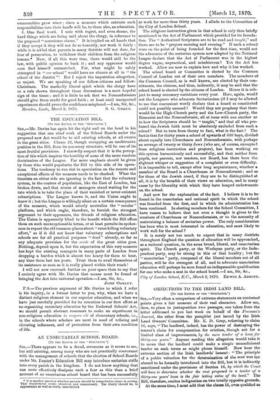AN UNSECTARIAN SCHOOL BOARD.
[TO THE EDITOR OF THE " SPECTATOR.1 Sirt,—There appears to be a dread, erroneous as it seems to me, but still existing, among many who are not practically conversant with the management of schools that the election of School Boards under Mr. Forster's Education Bill may introduce sectarian strife into every parish in the kingdom. I do not know anything that can more effectively dissipate such a fear as this than a brief account of an unsectarian school board that has been successfully • II Is another question whether parents should be compelled to object in writing. This requirement seems vexatious and uunecesbary. The liberty should be, in appearance as well as really, unrestricted. •
at work for more than thirty years. I allude to the Committee of the City of London School.
The religious instruction given in that school is only thus briefly mentioned in the Act of Parliament which provided for its founda- tion. The " Authorized Scriptures are to be read and taught," and there are to be "prayers morning and evening." If such a schooP were on the point of being founded for the first time, would not the advocates of the sectarian system now adopted by the National League declare that the Act of Parliament was in the highest degree vague, unpractical, and mischievous ? Yet the Act has- worked. Allow me now to explain how and why it has worked.
The school board or Committee is elected by the Common Council of London out of their own members. The members oft the Common Council, as is well known, are elected by their con- stituents, the citizens, and thus, indirectly, it may be said that the- school board is elected by the citizens of London. Hence it is sub- ject to many necessary variations every year. Here, again, would not the Leaguers who advocate Sectarianism (if I may be allowed. to use that convenient word) declare that a board so constituted could not possibly succeed? Would they not prophesy that there would be the High-Church party and the Low-Church party, the- Romanist and the Nonconformist, all at issue with one another as• to how the Scriptures should be " taught," and that all who pro fessed the Jewish faith must be absolutely excluded from such a school? But to turn from theory to fact, what is the fact ? The fact is that for thirty years a school of upwards of 600 boys, divided about equally into Churchmen and Nonconformists, with perhaps an average of twenty or thirty Jews (who are, of course, exempted from religious instruction and prayers), has been working on• this system harmoniously and successfully, and that neither from pupils, nor parents, nor masters, nor Board, has there been the slightest whisper or suggestion of a complaint or even difficulty. It is impossible to tell, except after long acquaintance, whether a. member of the Board is a Churchman or Nonconformist ; and as- for those of the Jewish creed, if they are to be distinguished at all, it is by the breadth of their views on education, and in many- cases by the liberality with which they have heaped endowments, on the school.
And now for the explanation of the fact. I believe it is to be- found in the unsectarian and national spirit in which the schools was founded from the first, and in which its administration has- been continued. In electing members for the School Committee, I have reason to believe that not even a thought is given to the numbers of Churchmen or Nonconformists, or to the necessity of; maintaining a balance of sectarian power. The only consideration, has been who is most interested in education, and most likely to, work well for the school ?
It is surely not too much to expect that in many districts- throughout England the question of education will be approached,. as a national question, in the same broad, liberal, and unsectarian. spirit. The Church party, or the Wesleyan party, or the Inde- pendent party, may be strong in this or that locality ; but the " unsectarian " party, composed of the liberal members out of all parties, will be the strongest of all, and to advocate unsectarian education will perhaps be soon found an indispensable qualification for one who seeks a seat in the school board.—I am, Sir, &c., City of London School, E.C., March 2, 1870. EDWIN A. Atmore-


































 Previous page
Previous page